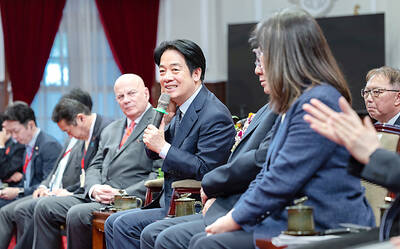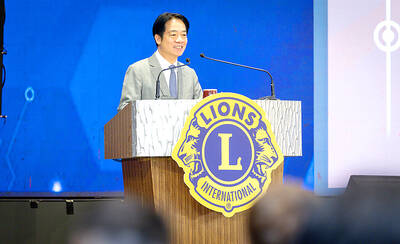China is attempting to trap Taiwan into accepting its "one China" policy by asking Taiwanese banks to sign cross-strait remittance agreements that include this policy, a top financial official said yesterday.
"We've banned Taiwanese banks from signing agreements with Bank of China (中國銀行) because the bank includes the `one China' principle in its agreements," Vice Minister of Finance Susan Chang (張秀蓮) said yesterday at a press conference.
Several Taiwanese banks received notices from China's state-run Bank of China on Monday, which required them to sign agreements on cross-strait transactions that are channeled via offshore banking units (OBU), Chang said.
However, these agreements seem to suggest that Taiwanese banks are endorsing China's perception of Taiwan as a renegade province, Chang said.
"It's a highly inappropriate and politicized move. And such petty maneuvering is actually unnecessary, ruining a business exchange that could have been simple and smooth," the vice minister said.
Chang then accused Beijing of also bringing politics into the issue of cross-strait commercial links -- which the local business community is preparing for.
However, a spokesman of the People's Bank of China (中國人民銀行), which serves as that country's central bank, yesterday told reporters that he has no information about the "one-China" requirement being attached to the cross-strait remittance agreements.
Politics have long hindered trade and financial ties between both sides of the Taiwan Strait, but Chang argued that it is China's actions that are creating obstacles to cross-strait trade normalization.
"China has to be responsible for any possible negative impact that this may have," said Chang.
According to Chang, other major mainland banks, including the Commercial Bank of China (中國工商銀行), the China Construction Bank (中國建設銀行) and the Agricultural Bank of China (中國農業銀行) have not yet proposed the same controversial requests.
The Ministry of Finance will pay close attention to avoid similar actions being repeated, she said. "Our bottom line is that political issues should not get involved [in electronic money transfers]."
Taiwan had previously approved OBUs of 15 major Taiwanese banks and 12 foreign banks to conduct direct transactions with Chinese banks, starting in March. It took China five months to evaluate the issue before giving the final go-ahead last Friday.
Minister of Finance Lee Yung-san (李庸三) on Monday welcomed China's goodwill gesture of opening cross-strait capital transfers, and all local banks claimed that they were ready and expected to launch the services very soon.

Two US House of Representatives committees yesterday condemned China’s attempt to orchestrate a crash involving Vice President Hsiao Bi-khim’s (蕭美琴) car when she visited the Czech Republic last year as vice president-elect. Czech local media in March last year reported that a Chinese diplomat had run a red light while following Hsiao’s car from the airport, and Czech intelligence last week told local media that Chinese diplomats and agents had also planned to stage a demonstrative car collision. Hsiao on Saturday shared a Reuters news report on the incident through her account on social media platform X and wrote: “I

‘BUILDING PARTNERSHIPS’: The US military’s aim is to continue to make any potential Chinese invasion more difficult than it already is, US General Ronald Clark said The likelihood of China invading Taiwan without contest is “very, very small” because the Taiwan Strait is under constant surveillance by multiple countries, a US general has said. General Ronald Clark, commanding officer of US Army Pacific (USARPAC), the US Army’s largest service component command, made the remarks during a dialogue hosted on Friday by Washington-based think tank the Center for Strategic and International Studies. Asked by the event host what the Chinese military has learned from its US counterpart over the years, Clark said that the first lesson is that the skill and will of US service members are “unmatched.” The second

STANDING TOGETHER: Amid China’s increasingly aggressive activities, nations must join forces in detecting and dealing with incursions, a Taiwanese official said Two senior Philippine officials and one former official yesterday attended the Taiwan International Ocean Forum in Taipei, the first high-level visit since the Philippines in April lifted a ban on such travel to Taiwan. The Ocean Affairs Council hosted the two-day event at the National Taiwan University Hospital International Convention Center. Philippine Navy spokesman Rear Admiral Roy Vincent Trinidad, Coast Guard spokesman Grand Commodore Jay Tarriela and former Philippine Presidential Communications Office assistant secretary Michel del Rosario participated in the forum. More than 100 officials, experts and entrepreneurs from 15 nations participated in the forum, which included discussions on countering China’s hybrid warfare

MORE DEMOCRACY: The only solution to Taiwan’s current democratic issues involves more democracy, including Constitutional Court rulings and citizens exercising their civil rights , Lai said The People’s Republic of China (PRC) is not the “motherland” of the Republic of China (ROC) and has never owned Taiwan, President William Lai (賴清德) said yesterday. The speech was the third in a series of 10 that Lai is scheduled to deliver across Taiwan. Taiwan is facing external threats from China, Lai said at a Lions Clubs International banquet in Hsinchu. For example, on June 21 the army detected 12 Chinese aircraft, eight of which entered Taiwanese waters, as well as six Chinese warships that remained in the waters around Taiwan, he said. Beyond military and political intimidation, Taiwan